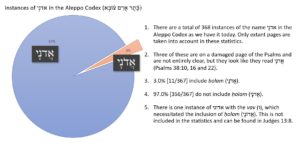In my estimation, the strangest facet of the question of the pronunciation of the Name might well be the excitement that Nehemia Gordon experiences when he or one of his skimmers discovers the Name with the cholam (as יְהוָֹה) in a manuscript of the Masoretic Text. They act as if the inclusion of cholam on the Name indicates that the scribes unconsciously wrote the proper vowels when not paying attention. This really makes Gordon giddy.
I’ve already discussed that the explanation for the lack of cholam is that it is not written on אֲדֹנָי. Copying the vowels of אֲדנָי to יהוה produces יְהוָה without a cholam.
However, when you look at the instances of אֲדֹנָי in the Aleppo Codex, you will find that in 97% of instances it lacks the cholam. In the other three percent, the cholam appears, and those appearances are in random places. We should be able to expect the same thing with יהוה. It should not come as a surprise that in a small percentage of instances we find the whole vowel set of אֲדֹנָי on the name. It is random and insignificant. All the other data weighs heavily against Yehovah as the original pronunciation.
Regarding the “thousands of manuscripts” that Nehemiah Gordon refers to as containing the full pointing יְהוָֹה, it would be far more significant if he discussed the standard practice of the individual scribes that produced the manuscripts and what percentage of the instances of the Tetragrammaton were pointed in which way. Otherwise, it is perfectly expected to find a percentage with the cholam.
